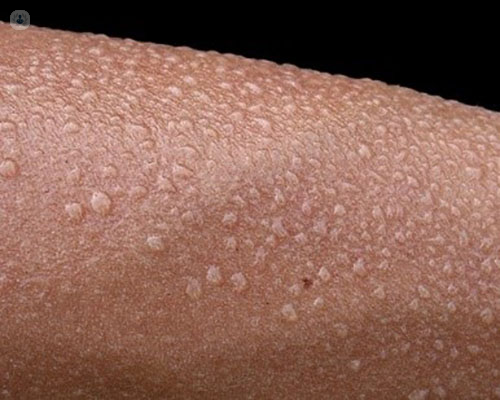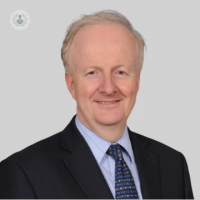You and your sweat – is it hyperhidrosis?
Written by:It’s hard to tell what ‘normal’ sweating is. There aren’t really any guidelines defining what the average should be. However, if you feel like you are sweating too much, and this affects your daily life significantly, visiting a doctor to talk about your sweating habits is definitely the best idea. Here, Professor Alun Davies, one of London’s most experienced vascular surgeons, talks about hyperhidrosis and the implications it has for patients.

Hyperhidrosis is a fairly common problem, where sweating affects the body excessively, either the whole body or certain areas. Areas that are often affected are the armpits, the soles of your feet, the groin, the palms of your hands, and the face and chest. Most commonly, both sides of the body are affected, which means both feet sweat, or both hands – not just one.
If you have hyperhidrosis, it isn’t a serious health problem, but it can cause mental grief and become extremely embarrassing for sufferers. Sufferers often feel self-conscious, avoiding physical contact, and not taking part in activities such as dancing or running. The sufferer may have to frequently shower, and constantly wash their clothes – all seemingly small activities that over time can be difficult to cope with.
What causes excessive sweating?
Hyperhidrosis doesn’t always have a clear cause, but is thought to be a reaction as a result of a problem in the nervous system (the part that controls sweating). If hyperhidrosis has an identifiable cause, it is known as secondary hyperhidrosis. Triggers can be, but are not limited to:
Hyperhidrosis is common and affects between one and three in every hundred in the UK. It typically displays itself first in puberty, but can occur at any age. When it becomes a problem in everyday life, the sufferer should seek medical help.
Hyperhidrosis treatment
Hyperhidrosis isn’t one of the easiest conditions to treat, and there may be a lot of trial and error when seeing what works for the patient. Firstly, doctors will recommend less invasive treatments, such as lifestyle changes, i.e. avoiding spicy foods, using antiperspirant rather than deodorant, armpit shields, wearing loose clothing not made of man-made fibres, and wearing special sports socks designed to absorb moisture.
A doctor may suggest a strong antiperspirant used to treat hyperhidrosis, or prescribe types of medicine that help block natural chemicals that activate the sweat glands. They may also refer you to a specialist or dermatologist, where special procedures such as botulinum toxin injections, or treatments using small electric currents to block the sweat glands may be suggested.
There are also various surgical procedures, which may involve removing or destroying the sweat glands, or clipping the nerves that control sweat in a particular area. For surgery like this, a specialist should always be consulted, and the patient should be made aware of any risks or other possible options for treatment.


